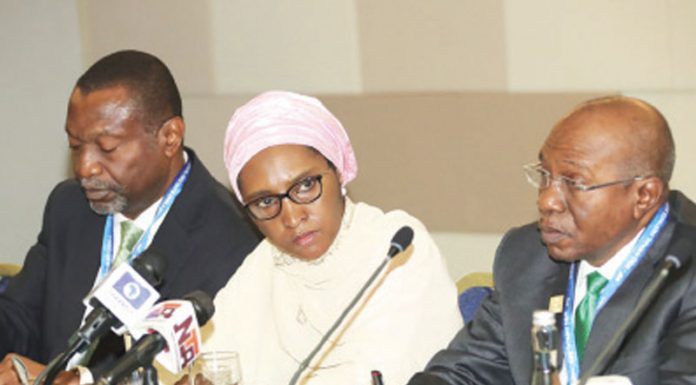This post has already been read 2337 times!
At the 2018 annual meetings of the International Monetary Fund and World Bank held in Bali, Indonesia, the Nigerian delegation led by the Minister of Finance, Mrs. Zainab Ahmed, had talks with development partners, including the Bretton Woods institutions and investors. Among the delegation were the Minister of Budget and National Planning, Senator Udoma Udo Udoma; Governor of the Central Bank of Nigeria, Mr. Godwin Emefiele; Permanent Secretary, Ministry of Finance, Mr. Mahmoud Isa-Dutse; Director-General, Debt Management Office, Ms Patience Oniha, and Acting Director-General, Securities and Exchange Commission, Ms. Mary Uduk. The team along with their foreign counterparts discussed ways to address development issues in Nigeria as well as attract foreign direct investments. At the close of the global summit, the Nigerian team briefed journalists on the outcomes of their meetings. Kunle Aderinokun and Obinna Chima, who were there, present the highlights
ZAINAB AHMED
Debt
As I stated earlier on and I think it has been collaborated by the three of us about Nigeria’s problem in respect of debt, we don’t have a debt problem, because at the ratio of 3 per cent of GDP we have one of the lowest debt, in fact, the lowest debt among our comparative countries.
What we have is a revenue problem and we need to work to increase our revenue to ease our debt service obligations. So we have to enhance our domestic revenue mobilisation so that we can ease the debt service burden that we now carry. We have a lot of headroom to borrow, but we are not rushing to borrow more because we have to consider the foreign debt service that we carry.
We have so far in the 2018 budget released N460 billion and this is for capital projects. For us to have to give you the lists of the capital projects, we have to review our monitoring report, that is where the schedule of the projects that have been implemented will be seen. But subsequently, we are looking at also the possibility of going forward, that when we release capital projects, we would clearly determine what projects the funds are released for. Going forward, we want to do that to support us in monitoring from the beginning not after the funds have been utilised as it currently obtains.
Building Fiscal Buffers
We really are in a situation where we have to consider increasing building fiscal buffers because even though the global economy is going positively upward there are still a lot of fragilities, a lot of countries, including our own, and the next wave of recession that might hit the global economy might not be the one that any country can quickly come out from unless the country has sufficient buffers. So as a country, both the federal and the state, we have to look at how to save more and we have to look at how to invest more in critical infrastructure that we yield revenue.
And that is what came across throughout the meeting from the World Bank, from the IMF, that all countries, not just Africa but globally need to build more fiscal buffers.
There are only a few countries in the world that have saved so much in the world that any shock will not affect them. So we have to do this to protect ourselves from external shocks that we are seeing coming from increase in rates in the US and also of the shocks we can get also nationally. And some of those shocks are shocks caused by natural occurrences. So we all need to be really, really ready.
Read More: ThisDay



